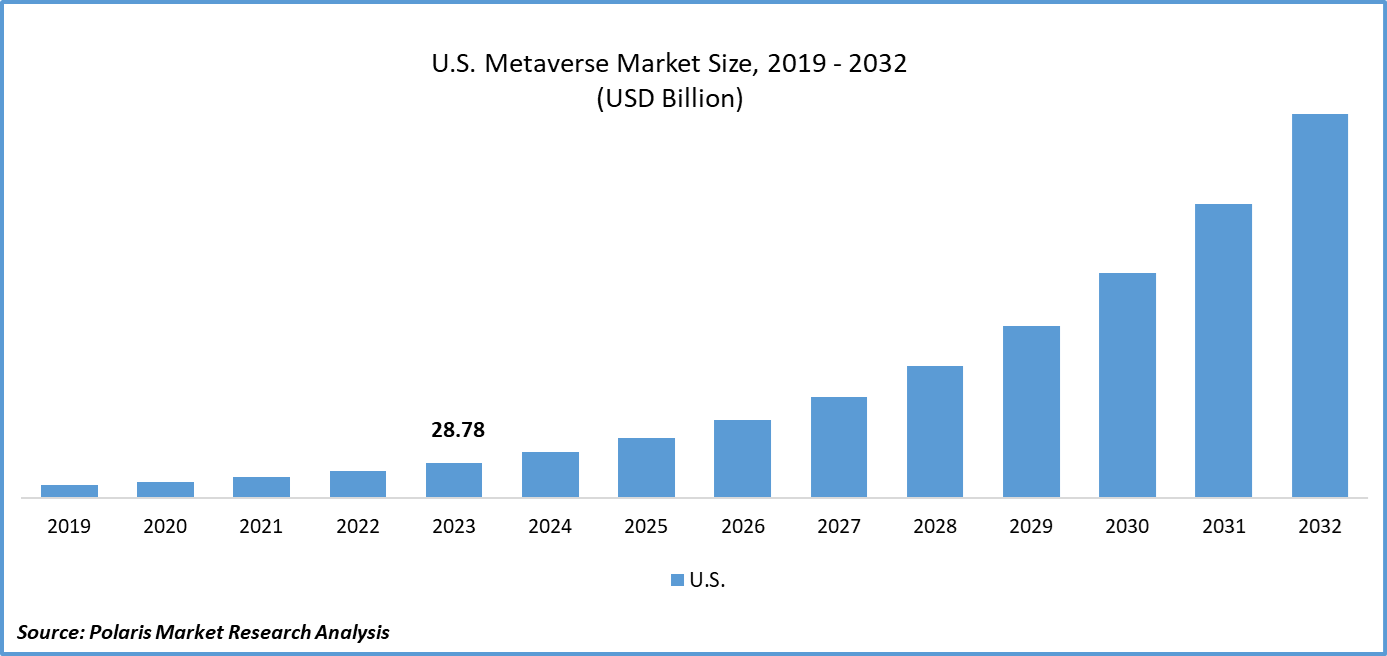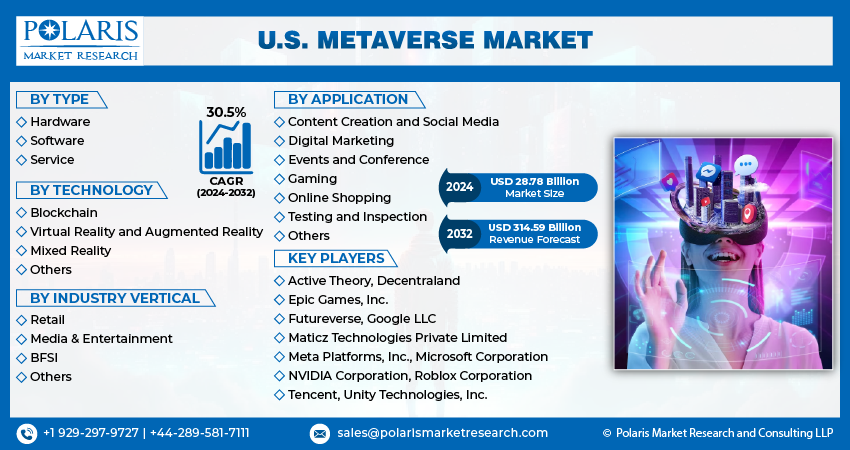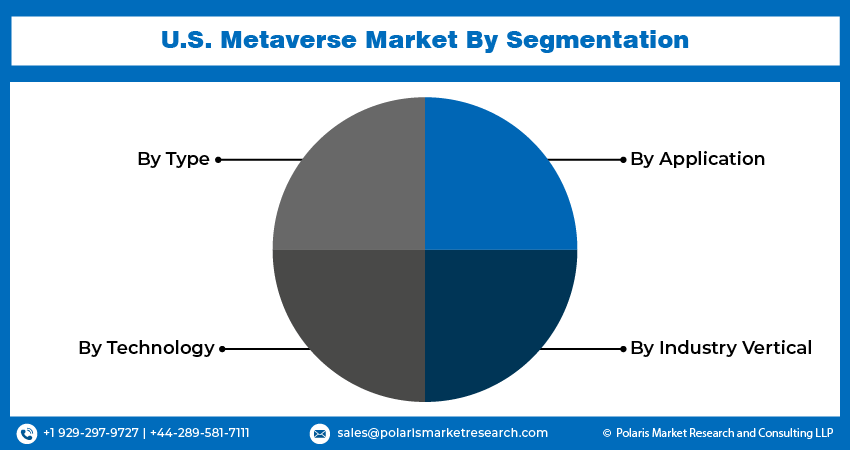
U.S. Metaverse Market Share, Size, Trends, Industry Analysis Report
By Component (Hardware, Software, Service); By Technology; By Application; By Industry Vertical; Segment Forecast, 2024 - 2032
- Published Date:Feb-2024
- Pages: 116
- Format: PDF
- Report ID: PM4522
- Base Year: 2023
- Historical Data: 2019 – 2022
Report Outlook
U.S. Metaverse Market size was valued at USD 28.78 billion in 2023. The market is anticipated to grow from USD 37.43 billion in 2024 to USD 314.59 billion by 2032, exhibiting a CAGR of 30.5% during the forecast period
Industry Trends
The metaverse is a term used to describe a future vision of the internet that is more immersive, interactive, and interconnected. It would allow users to access a shared virtual space where they could interact with each other and digital objects in real-time. The metaverse has been described as a kind of "virtual reality internet" and is seen by many as the internet's next evolution.
The U.S. metaverse market is an emerging and rapidly growing industry that has gained significant attention in recent years due to advancements in technologies such as virtual and augmented reality (VR/AR), blockchain, and cloud computing. Advances in VR/AR technology have made it possible to create more realistic and engaging virtual environments, which are crucial for the metaverse. Companies like Meta Platforms, Inc., Google, and Microsoft are investing heavily in VR/AR research and development, leading to improvements in hardware and software capabilities. As consumers are seeking more interactive and immersive experiences in gaming, entertainment, and social media, the metaverse offers a unique opportunity to provide these experiences, attracting a growing number of users and driving market growth.
For instance, in May 2022, WPP, a leading advertising and marketing services company, partnered with Epic Games, the creator of popular games such as Fortnite and Unreal Engine, to enable WPP agencies to offer cutting-edge digital experiences for brands in the metaverse. This collaboration will allow WPP to leverage Epic Games' expertise in creating immersive digital environments to help brands create engaging experiences for their customers in the virtual world.
Further, changing market trends toward cloud computing have made it possible to deliver high-quality content and applications seamlessly across devices, supporting the growth of the metaverse. Leading cloud providers such as Amazon Web Services (AWS), Microsoft Azure, and Google Cloud Platform are expanding their offerings to meet the demands of this emerging market.

To Understand More About this Research: Request a Free Sample Report
However, the U.S. metaverse market growth is hampered by several technical challenges, including latency issues, data privacy concerns, and interoperability between different platforms. Also, the metaverse operates in a legal gray area, with unclear regulations regarding data ownership, intellectual property rights, and user safety. All these factors affect the market growth, causing a reduced adoption rate by consumers.
Key Takeaways
- By type category, the software segment accounted for the largest U.S. metaverse market share in 2023
- By technology category, the virtual reality and augmented reality segment held the dominating U.S. metaverse market share in 2023
- By application category, the digital marketing segment is expected to grow with a significant CAGR over the market forecast period
What Are the Market Drivers Driving the Demand for the U.S. Metaverse Market?
The U.S Metaverse Market Growth is Driven by the Shift in Market Trends Toward Digital Asset Investments and Virtual Experiences
The U.S. Metaverse market is experiencing significant growth, driven by a shift in market trends towards digital asset investments and virtual experiences. As more people become familiar with blockchain technology and cryptocurrencies, they are looking for new ways to invest and engage with digital assets. At the same time, there is growing interest in immersive technologies such as virtual reality (VR) and augmented reality (AR), which enable users to interact with virtual environments that mimic real-world experiences or entirely new worlds. This has led to an increase in demand for metaverse platforms that allow users to create, buy, sell, and trade digital assets, as well as participate in various virtual experiences such as gaming, socializing, and entertainment.
Along with this, businesses are also exploring how they can leverage the metaverse to enhance their customer experience, improve collaboration, and streamline processes. All these factors combined have created a perfect storm of demand for the metaverse, leading to rapid growth in the market.
Which Factor Is Restraining the Demand for the U.S. Metaverse?
The Lack of Regulations or Regulatory Bodies in Open-Source and Decentralized Metaverse Models Is Hampering the U.S. Metaverse Market Growth
The lack of regulations or a regulatory body in open-source and decentralized metaverse models is a significant challenge hindering the growth of the U.S. There is unclarity on issues such as data privacy, security, and intellectual property rights, which deters investors and stakeholders from fully embracing these models. Moreover, a central authority to enforce rules and standards is needed to ensure interaction between different platforms and services, further complicating the development of a thriving metaverse ecosystem. In addition, the lack of regulation creates uncertainty around liability and accountability, making it challenging for businesses to navigate the legal landscape and potentially exposing users to risks such as fraudulent activities or unethical behavior. Establishing a robust regulatory framework would help address these concerns, provide stability and confidence to stakeholders, and ultimately foster the growth of the U.S. Metaverse market.

Report Segmentation
The market is primarily segmented based on type, technology, application, and industry vertical.
|
By Type |
By Technology |
By Application |
By Industry Vertical |
|
|
|
|
To Understand the Scope of this Report: Speak to Analyst
Category Wise Insights
By Type Insights
Based on type analysis, the market is segmented on the basis of hardware, software, and service. The software segment accounted for the largest share of the U.S. Metaverse market since the metaverse is fundamentally a virtual world that requires advanced software solutions to create an immersive and interactive environment for users. This has led to a high demand for sophisticated software platforms that can facilitate the creation, management, and interaction within these virtual spaces. Also, the development of complex algorithms, 3D modeling, and simulation technologies has further driven the growth of the software segment. The increasing adoption of cloud computing and artificial intelligence (AI) technologies has also contributed to the expansion of the software segment, as they enable seamless accessibility and enhanced user experiences within the metaverse.
By Technology Insights
Based on technology analysis, the market has been segmented on the basis of blockchain, virtual reality and augmented reality, mixed reality, and others. The virtual reality and augmented reality segment dominated the U.S. metaverse market size in 2023 since VR and AR technologies have been gaining significant traction in recent years, with advancements in hardware and software leading to more immersive and realistic experiences. In addition, these technologies have been increasingly adopted across various industries, such as gaming, education, healthcare, and entertainment, which has driven their growth in the metaverse market.
VR and AR are critical components of the metaverse ecosystem, enabling users to interact with virtual environments and objects in a seamless manner. As the metaverse continues to evolve, it is expected that VR and AR will play an even more crucial role in shaping its future, further solidifying its position in the market.
By Application Insights
Based on application analysis, the market has been segmented on the basis of content creation and social media, digital marketing, events and conferences, gaming, online shopping, and testing and inspection. The gaming applications segment dominated the U.S. metaverse market share since gaming has been a popular form of entertainment in the country for decades, and the rise of immersive technologies such as virtual and augmented reality has only increased its attraction.
Also, the metaverse offers a unique opportunity for gamers to engage in shared, interactive experiences that were previously not possible with traditional gaming platforms. This has led to a surge in the popularity of massively multiplayer online games (MMOs) and other social gaming experiences that leverage the metaverse's ability to create vast, interconnected virtual worlds. The metaverse allows for new monetization models, such as virtual goods and services, which have become a significant revenue stream for game developers. Further, the pandemic has accelerated the adoption of virtual environments for both work and play, boosting the demand for metaverse-based gaming applications.

Competitive Landscape
The U.S. Metaverse market is witnessing significant activity from various key players, including technology giants, startups, and investors. Companies like Meta, Google, Microsoft, and NVIDIA are investing heavily in virtual and augmented reality technologies to create immersive experiences for their users. Several startups are building virtual worlds and platforms that allow users to interact, collaborate, and participate in various activities.
Some of the major players operating in the U.S. market include:
- Active Theory
- Decentraland
- Epic Games, Inc.
- Futureverse
- Google LLC
- Maticz Technologies Private Limited
- Meta Platforms, Inc.
- Microsoft Corporation
- NVIDIA Corporation
- Roblox Corporation
- Tencent
- Unity Technologies, Inc.
Recent Developments
- In December 2023, Reebok launched a partnership with Futureverse, an artificial intelligence and metaverse tech company, to broaden the ways consumers interact with its products, from footwear to apparel.
- In June 2022, KPMG in the U.S. and KPMG in Canada announced the opening of the first KPMG metaverse collaboration hub, where employees, clients, and communities connect, engage, and explore opportunities for growth across industries and sectors.
- In April 2022, VictoryXR, a provider of augmented and virtual reality (AR/VR) content for schools and educational institutions, announced the launch of ten Metaversities in the U.S. to roll out digital twin campuses in order to provide learning options for students in the metaverse.
Report Coverage
The Metaverse market research report emphasizes key regions across the globe to provide a better understanding of the product to the users. Also, the report provides market insights into recent developments and trends and analyzes the technologies that are gaining traction around the globe. Furthermore, the report covers an in-depth qualitative analysis pertaining to various paradigm shifts associated with the transformation of these solutions.
The report provides a detailed analysis of the market while focusing on various key aspects such as competitive analysis, type, technology, application, industry vertical, and futuristic growth opportunities.
U.S. Metaverse Market Report Scope
|
Report Attributes |
Details |
|
Market size value in 2023 |
USD 28.78 billion |
|
Revenue Forecast in 2032 |
USD 314.59 billion |
|
CAGR |
30.5% from 2024 – 2032 |
|
Base year |
2023 |
|
Historical data |
2019 – 2022 |
|
Forecast period |
2024 – 2032 |
|
Quantitative units |
Revenue in USD billion and CAGR from 2024 to 2032 |
|
Segments Covered |
By Type, By Technology, By Application, By Industry Vertical |
|
Customization |
Report customization as per your requirements with respect to countries, regions, and segmentation. |
FAQ's
key companies in U.S. Metaverse Market are Active Theory, Decentraland, Epic Games, Inc., Futureverse, Google LLC, Maticz Technologies Private Limited
U.S. Metaverse Market exhibiting a CAGR of 30.5% during the forecast period
The U.S. Metaverse Market report covering key segments are type, technology, application, and industry vertical.
key driving factors in U.S. Metaverse Market are Advances in VR/AR technology drive market growth
The global Metaverse market size is expected to reach USD 314.59 Billion by 2032
